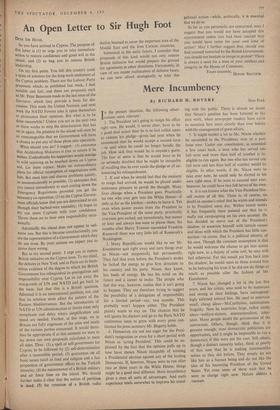Mere Incumbency
By RICHARD
IN the present situation, the following obser- vations seem relevant : 1. The President isn't going to resign his office right now. He would, it seems clear, have to be a good deal sicker than he is to feel called upon to redeem his pledge—given last year when he announced that he would accept .a second- term —to quit when he could no longer handle the job. How sick that would be is anyone's guess. The fear of some is that he would have to be so seriously disabled that he might be incapable of recalling that he ever made the pledge or of an- nouncing his relinquishment.
2. If and when he should feel that the moment to resign had arrived, he would be placed under enormous pressure to perish the thought. Many lives change when a President goes. Practically no one who ever gets into the White House—if only as far as the kitchen—wishes to leave it. Yet even when power passes from the President to the Vice-President of the same party, practically everyone gets sacked, not immediately, but sooner or later and always too soon to please them. Six months after Harry Truman succeeded Franklin Roosevelt there was very little left of Roosevelt's Washington.
3. Many Republicans would like to see Mr. Eisenhower quit right away and turn things over to Nixon—not temporarily but permanently.
They feel that even before the President's stroke he lacked the energy to give firm direction to his country and his party. Nixon, they know, has loads of energy. He has his mind on the future and a career to make. The people who feel this way, however, realise that it isn't going to happen. They are therefore trying to suggest the possibility of a delegation of responsibility for a limited period—say, two months. This probably won't happen either. The President plainly wants to stay on. The chances that he will ignore his doctors and go to the Paris NATO conference seem to grow with every press con- ference his press secretary Mr. Hagerty holds. 4. Democrats are not too eager for \ the Presi- dent's resignation or even for a short period with Nixon as 'acting President.' This could be ex- plained by the fact that the opinion polls up to now have shown Nixon incapable of winning a Presidential election againSt any of the leading Democrats. If, however, Nixon were to run after two or three years in the White House, things might be a good deal different. Mere incumbency gives a man all sorts of advantages. And mere experience tends somewhat to improve his stand- ing with the public. There is almost no doubt that Nixon's position has been bettered in the past week, when newspaper readers have come to associate him more closely than ever before with the management of great affairs.
5. It might matter a lot to Mr. Nixon whether he succeeded to the Presidency now or a year from now. Under our constitution, as amended a few years back, a man who has served one full term and more than half of another is in- eligible to run again. But one who has served one full term and less than half of another would be eligible. In other, words, if Mr. Nixon were to take over now, he could only be elected in his own right once. If he were to succeed next year, however, he could have two full terms of his own.
6. It is not known what the Vice-President him- self makes of all this. There is, of course, no doubt in anyone's mind that he wants and intends to be President some day. Within recent weeks it has frequently been pointed out that he is really out campaigning on his own account. He has decided to move out of the President's shadow, to associate himself with -certain causes and ideas with which the President has little con- nection—to create, that is, a political identity of his own. Though the common assumption is that he would welcome the chance to get into action right now, as a deputy of some sort, he may well feel otherwise. For this would put 'him back into the shadow; he would seem to those around him to be betraying his trust if he did not do things as much as possible after the fashion of Mr. Eisenhower.
7. Nixon has changed a lot in the last five years, and his critics, who used to be numerous and strong in their feelings, have correspond- ingly softened toward him. He used to entertain small, cheap ideas—McCarthyism, isolationism, frugality. Now he entertains large, rather costly ideas—welfare-statism, internationalism, toler- ance. Many people doubt the genuineness of the conversion. Others, though, think that it is genuine enough; most democratic politicians are opportunists, and it might be impossible to run a democracy if this were not the case. Still others, though a distinct minority today, think as poorly of him now that he is making statesmanlike noises as they did before. They simply do not like him as a human being and do not like the idea of his becoming President of the United States. Yet even some of these wish that he were in charge right , now. Nature abhors a vacuum.














































 Previous page
Previous page